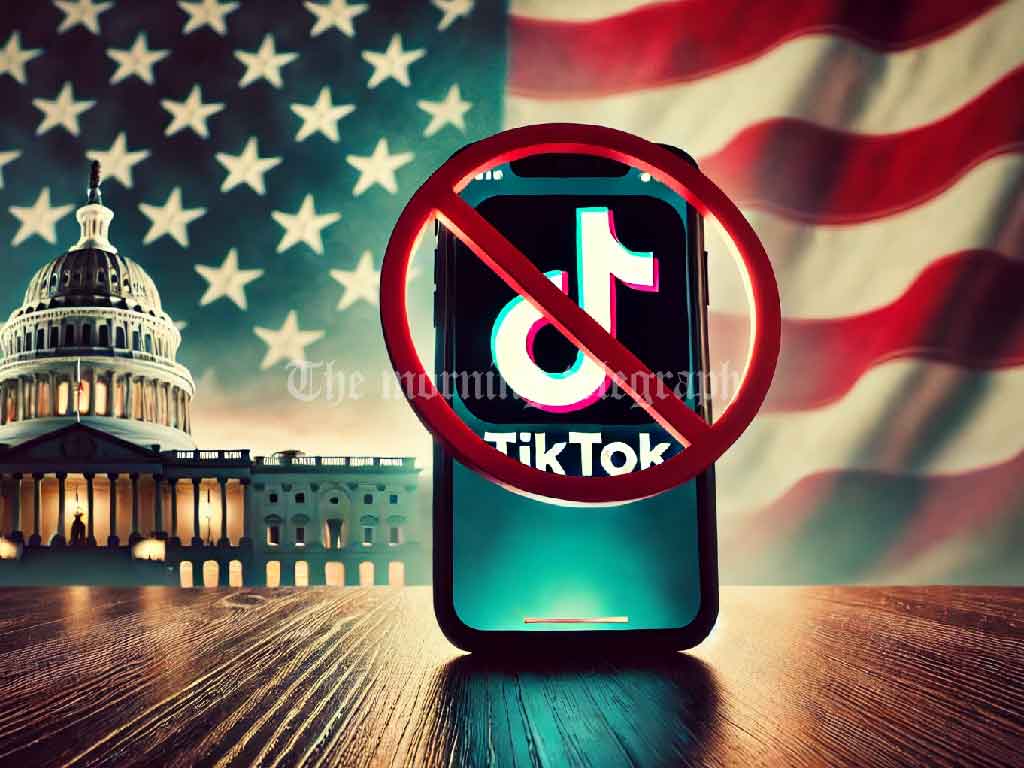
Millions of TikTok users in the United States were left without access to the popular social media platform as a federal ban on the app came into force on Saturday evening. The app was removed from major app stores, including Apple and Google, while its website displayed a message informing users that the service was no longer available. This sudden blackout occurred just hours before the new law took effect, marking a significant moment in the ongoing debate over TikTok’s operations in the U.S.
Users who tried to access TikTok on their devices were greeted with a pop-up message explaining the situation. The message stated, “Sorry, TikTok isn’t available right now. A law banning TikTok has been enacted in the U.S., and unfortunately, that means you can’t use TikTok for now.” It also hinted at potential future developments, noting, “We are fortunate that President Trump has indicated he will work with us on a solution to reinstate TikTok once he takes office.” Users were given the option to download their data, a process that TikTok warned could take several days.
Prior to the blackout, TikTok had issued a separate message to its users, acknowledging the impending shutdown and stating that it was working to restore U.S. services as quickly as possible. Despite these assurances, the timeline for a resolution remains unclear, leaving millions of users and creators in limbo.
Apple released a statement confirming that TikTok and other ByteDance-owned apps, such as CapCut and Lemon8, were no longer available for download in the U.S. The company clarified that users who already had these apps installed could continue using them but would not be able to redownload or update them. Apple also warned that this limitation could impact app performance, security, and compatibility with future updates.
TikTok CEO Shou Chew responded to the developments by posting a video expressing gratitude to President-elect Donald Trump for his stated commitment to keeping the platform available in the U.S. Chew praised Trump for defending free speech and emphasized the importance of TikTok as a tool for creative expression. Trump, for his part, indicated that he might consider granting TikTok a 90-day extension to operate in the U.S., hinting at a potential announcement after his inauguration.
The ban on TikTok was enacted as part of a broader $95 billion legislative package signed into law earlier this year, which also included foreign aid for Ukraine and Israel. The legislation required ByteDance, TikTok’s Beijing-based parent company, to either divest its ownership of the app or face a nationwide ban. ByteDance and TikTok challenged the law in court, arguing that it violated First Amendment rights, but the Supreme Court ruled unanimously in favor of the government, citing national security concerns.
The U.S. government has long accused TikTok of posing a security threat due to its Chinese ownership. Officials have alleged that the app collects vast amounts of user data that could potentially be accessed by the Chinese government. Concerns have also been raised about the app’s algorithm, with claims that it could be manipulated by Chinese authorities to influence content seen by users. However, no public evidence has been presented to substantiate these allegations.
The implementation of the ban has created confusion and controversy. While the law prohibits app stores from offering TikTok and hosting services from supporting its functionality, it does not explicitly require TikTok to shut down its platform. This ambiguity has led to questions about whether TikTok voluntarily ceased operations or was unable to continue due to lack of technical support from its providers.
ByteDance has so far resisted calls to sell TikTok, despite mounting pressure from lawmakers and potential buyers. Several investor groups have expressed interest in acquiring the app, including a consortium led by “Shark Tank” star Kevin O’Leary. Meanwhile, an artificial intelligence startup, Perplexity AI, has proposed forming a joint venture with TikTok’s U.S. operations, but no concrete plans have been announced.
The ban has also drawn criticism from China, where commentators have accused the U.S. of suppressing free speech. Hu Xijin, a former editor of the Chinese state-run Global Times, described the ban as “brutal suppression of an internet application” by a nation that claims to champion freedom of expression. While TikTok itself does not operate in China, ByteDance offers a domestic version of the app, Douyin, which adheres to Beijing’s strict censorship regulations.
As TikTok remains inaccessible to American users, questions about the platform’s future persist. Lawmakers, tech companies, and users are closely watching to see whether the platform can navigate this complex political and regulatory landscape. For now, millions of U.S. users are left in uncertainty, awaiting a resolution that could determine the app’s fate in the country.




